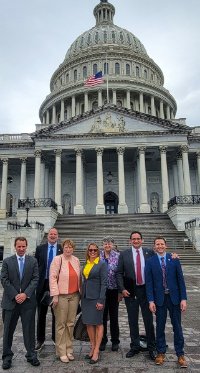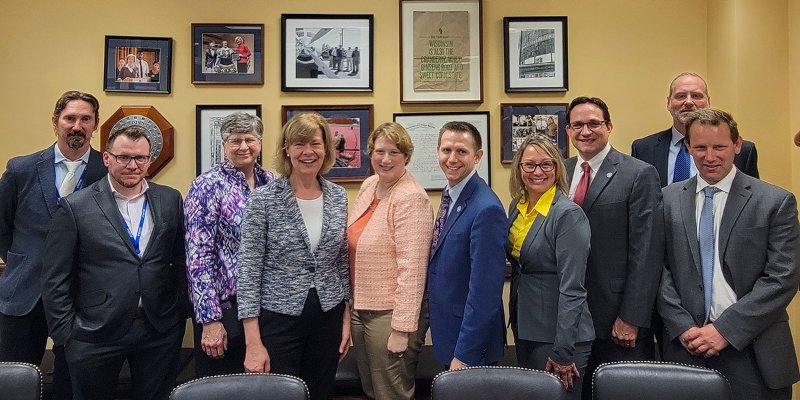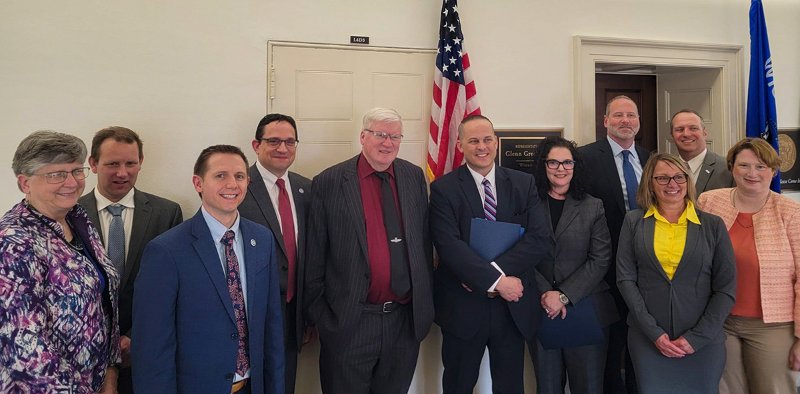Vol. 66, Issue 17
View more issues of The Valued Voice
Sign Up for WHA's Newsletter
Click here to view past issues
IN THIS ISSUE
- WHA and Members Back in D.C. to Meet with Wisconsin's Congressional Delegation
- New Program to Expand Access to Substance Abuse Treatment in Rural WI
- WHA Helps Member Hospitals Uncover and Address Community Health Challenges
- Registration Open for In-person 2022 Physician Leadership Development Conference
- WHA Health Care Leadership Academy Participants Learn about the Discipline of Quality Improvement
EDUCATION EVENTS
Jan. 26, 2026
Survey ReadinessJan. 28, 2026
2026 WHA Health Care Leadership AcademyFeb. 10, 2026
Age-Friendly Webinar Series Featuring Advocate HealthClick here to view education event calendar
View more issues of The Valued Voice
Sign Up for WHA's Newsletter
Thursday, April 28, 2022
 The Wisconsin Hospital Association and leaders from hospitals and health systems from across the state traveled to Washington, D.C., to meet with Wisconsin’s congressional delegation on April 26.
The Wisconsin Hospital Association and leaders from hospitals and health systems from across the state traveled to Washington, D.C., to meet with Wisconsin’s congressional delegation on April 26.
Those participating included John Russell of Prairie Ridge Health, Michelle Abey and Teresa Lindfors of Stoughton Health, Bob Van Meeteren of Reedsburg Area Medical Center, Teresa Neely of UW Health, Nathan Franklin and Bill Farrell of Gundersen Health System, Tony Curry of Advocate Aurora Health, Brad Wolters of Marshfield Clinic Health System, Jeremy Levin of the Rural Wisconsin Health Cooperative, Peg Larson of Partners of WHA as well as Eric Borgerding and Jon Hoelter of WHA.
Among the main discussion topics WHA advocated for were continuing regulatory flexibilities made possible by the public health emergency (PHE), easing the health care workforce shortage and stemming the effects of inflation and other mounting fiscal challenges for hospitals and health systems.
WHA’s group of hospital advocates thanked Wisconsin's congressional delegation members for their past support of continuing Medicare's telehealth flexibilities beyond the federal public health emergency. Thanks to legislation passed in mid-March, most of the telehealth waivers will continue 151 days past the end of the current PHE, which is slated to end in mid-July. Should this be the last extension of the PHE, Congress would need to act by mid-December to continue these telehealth flexibilities.
“COVID has essentially been a giant pilot program for regulatory relief and reform and has proven in a rapid way how we can make common sense changes to the ways we deliver and staff health care,” said WHA President and CEO Eric Borgerding. “With so many challenges still coming at us, it’s time to leverage what we’ve learned from this pandemic and make many of these regulatory waivers permanent policy. That’s really what this D.C. trip was about.”
While Congress is aware of the need to act on telehealth, WHA also tried to build support for a number of other flexibilities that could expire when the PHE ends. These include the highly successful hospital at home program, Emergency Medical Treatment and Labor Act (EMTALA) waivers that allow for curbside and drive-up testing, vaccinations and lab draws, and critical access hospital (CAH) waivers that allow those hospitals to exceed the 25-bed cap and 96-hour average length of stay.
Many of WHA's group of CAH leaders explained how patient acuity has been increasing, noting that their average length of stay has exceeded 96 hours due to this and other factors, such as the difficulties in finding nursing homes willing to accept patients and even open hospital beds at hospitals that typically treat higher-acuity patients. Additionally, members of Gundersen Health, UW Health, Marshfield Clinic Health System and Advocate Aurora Health, all of whom recently signed onto a WHA letter to the House Ways and Means and Senate Finance committees, urged members of the congressional delegation to sign onto the Hospital Inpatient Services Modernization Act, which would extend the hospital at home program for two years past the end of the PHE. This program allows patients to receive certain inpatient hospital services in the comfort of their own homes and has been an extremely cost-effective way to both free up hospital beds and improve patient outcomes and satisfaction.
 WHA and hospital leaders meet with Sen. Tammy Baldwin.
WHA and hospital leaders meet with Sen. Tammy Baldwin.
Tied into the need for these flexibilities are the mounting workforce and fiscal challenges facing hospitals. Hospital leaders shared the challenges they have faced in filling vacancies for all types of frontline health care staff after an extremely challenging COVID-19 pandemic. They also explained how shortages have led to rising labor costs, which is particularly challenging given that labor costs often make up as much as 60% of a hospital's operating costs. The increases in these input costs are becoming particularly hard to bear given that Medicare pays on average 73% of what it costs to deliver care, and revenues from Medicare have been stagnant for years. While private health insurance increases have exceeded health care cost increases significantly over the last decade, private payers are increasingly unwilling to negotiate price increases in new contracts.
 WHA and hospital leaders meet with Congressman Glenn Grothman.
WHA and hospital leaders meet with Congressman Glenn Grothman.
"I want to thank everyone who joined us for this very important trip to meet with our federal officials," said WHA President and CEO Eric Borgerding. "There is no doubt that our health care system faces some very significant challenges as we attempt to put COVID in the rearview mirror. These visits with our lawmakers give them critical insights so they can push for federal policies that grant us the flexibilities and support we will need to continue delivering some of the best quality and value health care in our nation."
WHA and Members Back in D.C. to Meet with Wisconsin's Congressional Delegation
 The Wisconsin Hospital Association and leaders from hospitals and health systems from across the state traveled to Washington, D.C., to meet with Wisconsin’s congressional delegation on April 26.
The Wisconsin Hospital Association and leaders from hospitals and health systems from across the state traveled to Washington, D.C., to meet with Wisconsin’s congressional delegation on April 26.Those participating included John Russell of Prairie Ridge Health, Michelle Abey and Teresa Lindfors of Stoughton Health, Bob Van Meeteren of Reedsburg Area Medical Center, Teresa Neely of UW Health, Nathan Franklin and Bill Farrell of Gundersen Health System, Tony Curry of Advocate Aurora Health, Brad Wolters of Marshfield Clinic Health System, Jeremy Levin of the Rural Wisconsin Health Cooperative, Peg Larson of Partners of WHA as well as Eric Borgerding and Jon Hoelter of WHA.
Among the main discussion topics WHA advocated for were continuing regulatory flexibilities made possible by the public health emergency (PHE), easing the health care workforce shortage and stemming the effects of inflation and other mounting fiscal challenges for hospitals and health systems.
WHA’s group of hospital advocates thanked Wisconsin's congressional delegation members for their past support of continuing Medicare's telehealth flexibilities beyond the federal public health emergency. Thanks to legislation passed in mid-March, most of the telehealth waivers will continue 151 days past the end of the current PHE, which is slated to end in mid-July. Should this be the last extension of the PHE, Congress would need to act by mid-December to continue these telehealth flexibilities.
“COVID has essentially been a giant pilot program for regulatory relief and reform and has proven in a rapid way how we can make common sense changes to the ways we deliver and staff health care,” said WHA President and CEO Eric Borgerding. “With so many challenges still coming at us, it’s time to leverage what we’ve learned from this pandemic and make many of these regulatory waivers permanent policy. That’s really what this D.C. trip was about.”
While Congress is aware of the need to act on telehealth, WHA also tried to build support for a number of other flexibilities that could expire when the PHE ends. These include the highly successful hospital at home program, Emergency Medical Treatment and Labor Act (EMTALA) waivers that allow for curbside and drive-up testing, vaccinations and lab draws, and critical access hospital (CAH) waivers that allow those hospitals to exceed the 25-bed cap and 96-hour average length of stay.
Many of WHA's group of CAH leaders explained how patient acuity has been increasing, noting that their average length of stay has exceeded 96 hours due to this and other factors, such as the difficulties in finding nursing homes willing to accept patients and even open hospital beds at hospitals that typically treat higher-acuity patients. Additionally, members of Gundersen Health, UW Health, Marshfield Clinic Health System and Advocate Aurora Health, all of whom recently signed onto a WHA letter to the House Ways and Means and Senate Finance committees, urged members of the congressional delegation to sign onto the Hospital Inpatient Services Modernization Act, which would extend the hospital at home program for two years past the end of the PHE. This program allows patients to receive certain inpatient hospital services in the comfort of their own homes and has been an extremely cost-effective way to both free up hospital beds and improve patient outcomes and satisfaction.
 WHA and hospital leaders meet with Sen. Tammy Baldwin.
WHA and hospital leaders meet with Sen. Tammy Baldwin.Tied into the need for these flexibilities are the mounting workforce and fiscal challenges facing hospitals. Hospital leaders shared the challenges they have faced in filling vacancies for all types of frontline health care staff after an extremely challenging COVID-19 pandemic. They also explained how shortages have led to rising labor costs, which is particularly challenging given that labor costs often make up as much as 60% of a hospital's operating costs. The increases in these input costs are becoming particularly hard to bear given that Medicare pays on average 73% of what it costs to deliver care, and revenues from Medicare have been stagnant for years. While private health insurance increases have exceeded health care cost increases significantly over the last decade, private payers are increasingly unwilling to negotiate price increases in new contracts.
 WHA and hospital leaders meet with Congressman Glenn Grothman.
WHA and hospital leaders meet with Congressman Glenn Grothman."I want to thank everyone who joined us for this very important trip to meet with our federal officials," said WHA President and CEO Eric Borgerding. "There is no doubt that our health care system faces some very significant challenges as we attempt to put COVID in the rearview mirror. These visits with our lawmakers give them critical insights so they can push for federal policies that grant us the flexibilities and support we will need to continue delivering some of the best quality and value health care in our nation."
Vol. 66, Issue 17
Thursday, April 28, 2022
WHA and Members Back in D.C. to Meet with Wisconsin's Congressional Delegation
 The Wisconsin Hospital Association and leaders from hospitals and health systems from across the state traveled to Washington, D.C., to meet with Wisconsin’s congressional delegation on April 26.
The Wisconsin Hospital Association and leaders from hospitals and health systems from across the state traveled to Washington, D.C., to meet with Wisconsin’s congressional delegation on April 26.Those participating included John Russell of Prairie Ridge Health, Michelle Abey and Teresa Lindfors of Stoughton Health, Bob Van Meeteren of Reedsburg Area Medical Center, Teresa Neely of UW Health, Nathan Franklin and Bill Farrell of Gundersen Health System, Tony Curry of Advocate Aurora Health, Brad Wolters of Marshfield Clinic Health System, Jeremy Levin of the Rural Wisconsin Health Cooperative, Peg Larson of Partners of WHA as well as Eric Borgerding and Jon Hoelter of WHA.
Among the main discussion topics WHA advocated for were continuing regulatory flexibilities made possible by the public health emergency (PHE), easing the health care workforce shortage and stemming the effects of inflation and other mounting fiscal challenges for hospitals and health systems.
WHA’s group of hospital advocates thanked Wisconsin's congressional delegation members for their past support of continuing Medicare's telehealth flexibilities beyond the federal public health emergency. Thanks to legislation passed in mid-March, most of the telehealth waivers will continue 151 days past the end of the current PHE, which is slated to end in mid-July. Should this be the last extension of the PHE, Congress would need to act by mid-December to continue these telehealth flexibilities.
“COVID has essentially been a giant pilot program for regulatory relief and reform and has proven in a rapid way how we can make common sense changes to the ways we deliver and staff health care,” said WHA President and CEO Eric Borgerding. “With so many challenges still coming at us, it’s time to leverage what we’ve learned from this pandemic and make many of these regulatory waivers permanent policy. That’s really what this D.C. trip was about.”
While Congress is aware of the need to act on telehealth, WHA also tried to build support for a number of other flexibilities that could expire when the PHE ends. These include the highly successful hospital at home program, Emergency Medical Treatment and Labor Act (EMTALA) waivers that allow for curbside and drive-up testing, vaccinations and lab draws, and critical access hospital (CAH) waivers that allow those hospitals to exceed the 25-bed cap and 96-hour average length of stay.
Many of WHA's group of CAH leaders explained how patient acuity has been increasing, noting that their average length of stay has exceeded 96 hours due to this and other factors, such as the difficulties in finding nursing homes willing to accept patients and even open hospital beds at hospitals that typically treat higher-acuity patients. Additionally, members of Gundersen Health, UW Health, Marshfield Clinic Health System and Advocate Aurora Health, all of whom recently signed onto a WHA letter to the House Ways and Means and Senate Finance committees, urged members of the congressional delegation to sign onto the Hospital Inpatient Services Modernization Act, which would extend the hospital at home program for two years past the end of the PHE. This program allows patients to receive certain inpatient hospital services in the comfort of their own homes and has been an extremely cost-effective way to both free up hospital beds and improve patient outcomes and satisfaction.
 WHA and hospital leaders meet with Sen. Tammy Baldwin.
WHA and hospital leaders meet with Sen. Tammy Baldwin.Tied into the need for these flexibilities are the mounting workforce and fiscal challenges facing hospitals. Hospital leaders shared the challenges they have faced in filling vacancies for all types of frontline health care staff after an extremely challenging COVID-19 pandemic. They also explained how shortages have led to rising labor costs, which is particularly challenging given that labor costs often make up as much as 60% of a hospital's operating costs. The increases in these input costs are becoming particularly hard to bear given that Medicare pays on average 73% of what it costs to deliver care, and revenues from Medicare have been stagnant for years. While private health insurance increases have exceeded health care cost increases significantly over the last decade, private payers are increasingly unwilling to negotiate price increases in new contracts.
 WHA and hospital leaders meet with Congressman Glenn Grothman.
WHA and hospital leaders meet with Congressman Glenn Grothman."I want to thank everyone who joined us for this very important trip to meet with our federal officials," said WHA President and CEO Eric Borgerding. "There is no doubt that our health care system faces some very significant challenges as we attempt to put COVID in the rearview mirror. These visits with our lawmakers give them critical insights so they can push for federal policies that grant us the flexibilities and support we will need to continue delivering some of the best quality and value health care in our nation."
IN THIS ISSUE
- WHA and Members Back in D.C. to Meet with Wisconsin's Congressional Delegation
- New Program to Expand Access to Substance Abuse Treatment in Rural WI
- WHA Helps Member Hospitals Uncover and Address Community Health Challenges
- Registration Open for In-person 2022 Physician Leadership Development Conference
- WHA Health Care Leadership Academy Participants Learn about the Discipline of Quality Improvement

